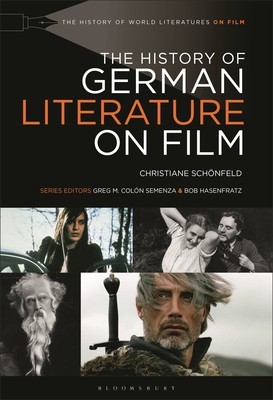
- We will send in 10–14 business days.
- Author: Christiane Schönfeld
- Publisher: Bloomsbury Academic
- ISBN-10: 1628923768
- ISBN-13: 9781628923766
- Format: 15.2 x 22.9 x 3.8 cm, hardcover
- Language: English
- SAVE -10% with code: EXTRA
Reviews
Description
This book tells the story of German-language literature on film, beginning with pioneering motion picture adaptations of Faust in 1897 and early debates focused on high art as mass culture. It explores, analyzes and contextualizes the so-called 'golden age' of silent cinema in the 1920s, the impact of sound on adaptation practices, the abuse of literary heritage by Nazi filmmakers, and traces the role of German-language literature in exile and postwar films, across ideological boundaries in divided Germany, in New German Cinema, and in remakes and movies for cinema as well as television and streaming services in the 21st century. Having provided the narrative core to thousands of films since the late 19th century, many of German cinema's most influential masterpieces were inspired by canonical texts, popular plays, and even children's literature. Not being restricted to German adaptations, however, this book also traces the role of literature originally written in German in international film productions, which sheds light on the interrelation between cinema and key historical events. It outlines how processes of adaptation are shaped by global catastrophes and the emergence of nations, by materialist conditions, liberal economies and capitalist imperatives, political agendas, the mobility of individuals, and sometimes by the desire to create reflective surfaces and, perhaps, even art. Commercial cinema's adaptation practices have foregrounded economic interest, but numerous filmmakers throughout cinema history have turned to German-language literature not simply to entertain, but as a creative contribution to the public sphere, marking adaptation practice, at least potentially, as a form of active citizenship.
EXTRA 10 % discount with code: EXTRA
The promotion ends in 20d.05:32:38
The discount code is valid when purchasing from 10 €. Discounts do not stack.
- Author: Christiane Schönfeld
- Publisher: Bloomsbury Academic
- ISBN-10: 1628923768
- ISBN-13: 9781628923766
- Format: 15.2 x 22.9 x 3.8 cm, hardcover
- Language: English English
This book tells the story of German-language literature on film, beginning with pioneering motion picture adaptations of Faust in 1897 and early debates focused on high art as mass culture. It explores, analyzes and contextualizes the so-called 'golden age' of silent cinema in the 1920s, the impact of sound on adaptation practices, the abuse of literary heritage by Nazi filmmakers, and traces the role of German-language literature in exile and postwar films, across ideological boundaries in divided Germany, in New German Cinema, and in remakes and movies for cinema as well as television and streaming services in the 21st century. Having provided the narrative core to thousands of films since the late 19th century, many of German cinema's most influential masterpieces were inspired by canonical texts, popular plays, and even children's literature. Not being restricted to German adaptations, however, this book also traces the role of literature originally written in German in international film productions, which sheds light on the interrelation between cinema and key historical events. It outlines how processes of adaptation are shaped by global catastrophes and the emergence of nations, by materialist conditions, liberal economies and capitalist imperatives, political agendas, the mobility of individuals, and sometimes by the desire to create reflective surfaces and, perhaps, even art. Commercial cinema's adaptation practices have foregrounded economic interest, but numerous filmmakers throughout cinema history have turned to German-language literature not simply to entertain, but as a creative contribution to the public sphere, marking adaptation practice, at least potentially, as a form of active citizenship.


Reviews